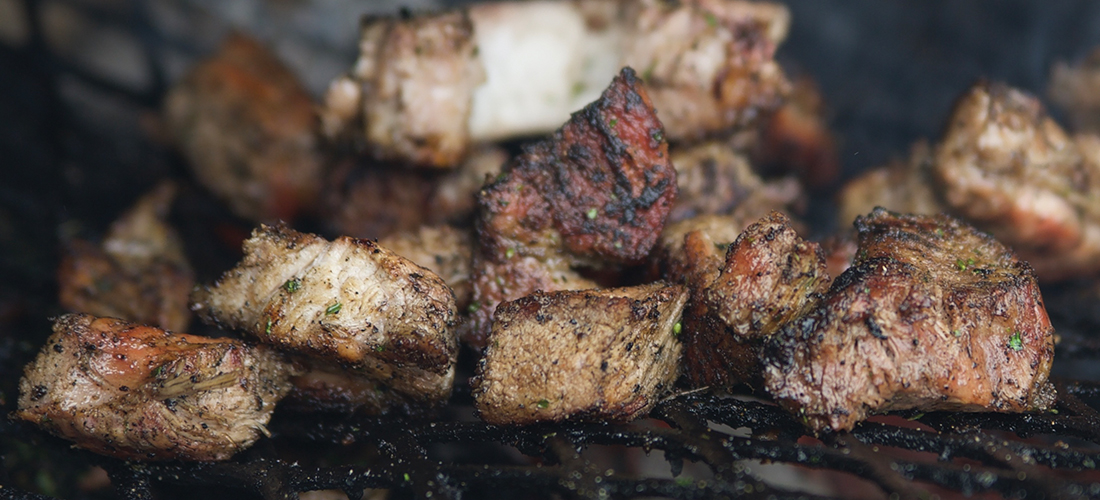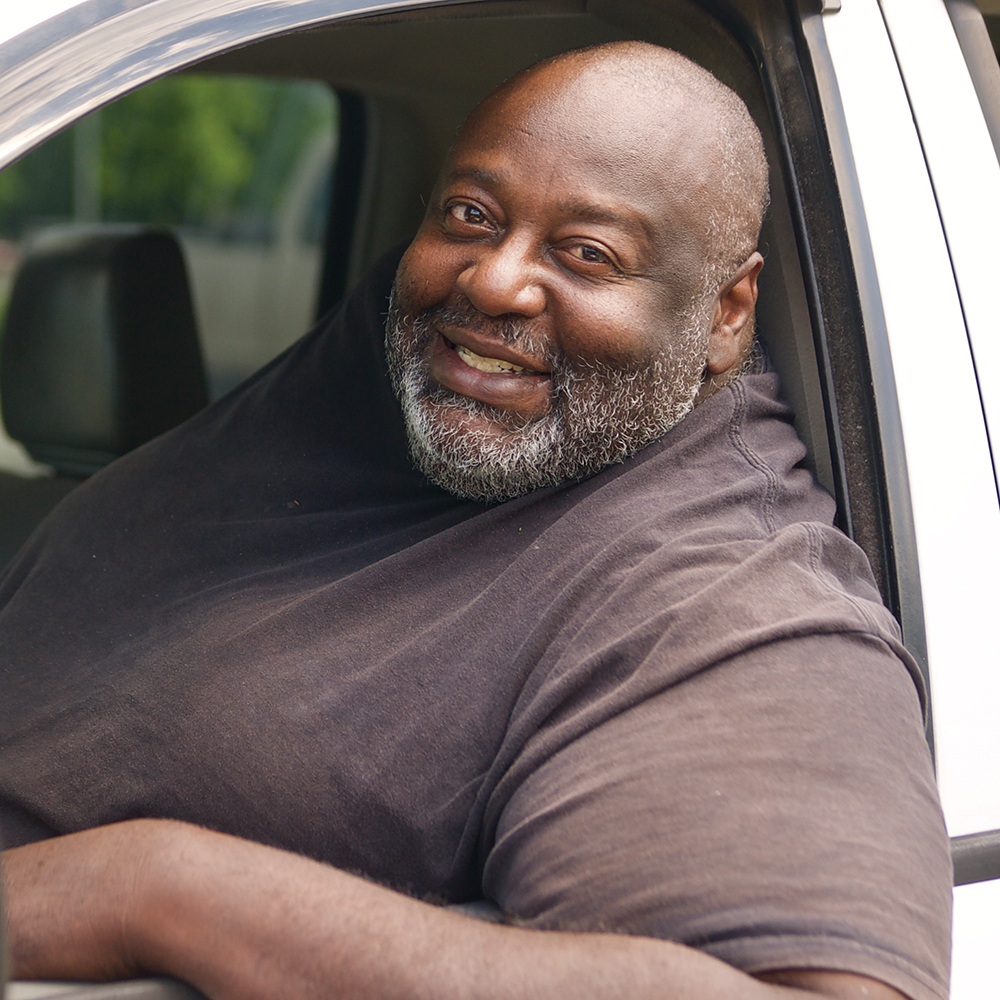
The Crazy Rib Man
How a helping of ribs becomes a helping hand
By Ross Howell Jr.
 The first time I met the Crazy Rib Man was at a Zeto’s wine tasting about three years ago. His tent and cooker were set up at the popular downtown Greensboro wine shop, so I figured I’d take supper home after the event.
The first time I met the Crazy Rib Man was at a Zeto’s wine tasting about three years ago. His tent and cooker were set up at the popular downtown Greensboro wine shop, so I figured I’d take supper home after the event.
One of my buddies I’d invited didn’t show, so I used his tickets along with mine to sample wines. By the time I’d visited all the tasting stations and stepped outside, I was feeling very good about the cosmos and the space I was occupying within it.
In my elevated state, I saw there wasn’t a cloud in the sky. The sun was just setting behind the Grasshoppers’ stadium, and its light washed the sidewalks and buildings around me with gold. I stepped up to a folding table covered with a paper tablecloth and squeeze bottles of barbecue sauce, ketchup and mustard. I studied the posted menu a little unsteadily, then ordered a half rack of ribs.
White smoke purled from the cooker as a man sliced ribs and scattered them on the grill. I watched the ribs sizzle as he turned them occasionally. After a few minutes, he stepped back from the cooker and picked up a Styrofoam box. He put a thick piece of white bread in the bottom, then expertly lined up the ribs atop it. He closed the lid and handed me the box.
I handed him a twenty.
“Barbecue sauce is right there,” the man said. “The Rib Man makes it special.”
He stepped away from the table with the bill and walked toward a white Dodge pickup parked by the cooker. There were big propane bottles stacked in the bed of the pickup.
Maybe it was my elevated state, maybe it was the beautiful evening light, or maybe it was just my active imagination — whatever it was, the man sitting in the pickup, making change for my twenty grew larger than life.
He was large in life, mind you, his broad shoulders taking up half the width of the pickup cab. His hair and beard were cropped close, with a tint of gray and his black T-shirt was just slightly darker than the color of his skin.
I opened the Styrofoam box, shook the barbecue sauce bottle, and prepared to squeeze the contents all over the ribs.
“You might not need much barbecue sauce,” the Crazy Rib Man said. “Taste those ribs first.”
I sampled one. He was right. The tender meat evaporated in my mouth like smoke. I squirted a small swirl of sauce in the corner of the container, reclosed it, and took my change.
“Thanks,” I said. “Do you have a card?”
He draped his arm from the pickup cab with a business card between his fingers. I could see his bright smile in the shadows of the cab. The cook brought me the card and I headed for home.
I’m not even sure how I came to learn his name, but it was somewhere over the years of picking up his ribs for my birthday parties, or for gatherings of neighbors and friends, or for just whenever I had a hankering for them.
His name is Rex Durrett. Somehow it’s perfect — better than any name my novelist’s imagination could invent. I friended him on Facebook.
He’s from Memphis, Tennessee, and grew up in a family of 13 brothers and sisters. His mother was a cook and his father was a garbage collector. Durrett was a boy during the time of the Memphis Sanitation Workers strike, when African-American men marched downtown carrying “I Am a Man” placards, and Dr. Martin Luther King Jr. joined them in a march just a day before he was shot dead on the balcony of the Lorraine Motel on Mulberry Street.
“I was just a boy, you know,” Durrett says. “I don’t remember much about all that.”
What he remembers clearly is the love both his mother and father had
for cooking.
“In those days there weren’t many restaurants in Memphis, especially outside of downtown,” he says. “So people in the black communities would cook, you know? And if people liked somebody’s cooking, they’d come and buy it.” Durret got started cooking while watching my mother and father, and working with them. “It was real on-the-job training,” he says. “I liked it. And I made a little money at it as a kid.”
After finishing high school in Memphis, Durrett lived in Texas for a while. That was followed by enlistment in the U.S. Army. Then he returned to Memphis.
“I was offered a scholarship to attend college at North Carolina A&T,” he says. “That’s how I first came to Greensboro. I was a little different, you know, since I was older than my classmates.”
Durrett studied under Professor H. D. Flowers II, head of the A&T professional theater department at the time. A tough taskmaster, Flowers was remembered as “Papa” by former students when he passed away in 2010.
Durrett admired Flowers, but found that college just wasn’t for him.
“I’ve always been a hands-on type of guy,” he says. “This idea of sitting back and listening, like you’re a vessel receiving information, it just wasn’t for me.”
Durrett found that he preferred independent study, working in the library, reading on his own. Though he left college, he is fully committed to higher education.
“This country needs minds,” he says. “But it’s insane what we have to pay for education. We wind up with young people saddled with all this debt.”
While at A&T, Durrett “met a lady,” and stayed on in Greensboro. He managed a Pizza Hut. He delivered pizzas for Domino’s.
“That was a ball,” Durrett says. “I enjoyed
the freedom, being out there, meeting all kinds of people.”
Then, about 10 years ago, he decided to start cooking ribs.
“I’m being honest,” Durrett says. “It was for revenge. A man I knew didn’t treat me right in business, and I thought, ‘You know, I’m going to mess in his business a little bit.’”
A little bit turned into quite a lot. He traveled widely, cooking ribs at automobile shows, motorcycle shows, music festivals and sports events.
“Football games are great,” Durrett says. “People are in a good mood, there’s camaraderie. It’s fun.”
He’s done all sorts of festivals.
“Wine festivals, cooking festivals, church festivals,” Durrett says. “Oh, there was this big Jamaican party in Asheville,” Durrett says. “And we did the Gullah Festival in South Carolina. That was a blast.”
According to the Original Gullah Festival website, the program in Beaufort, S.C., was established to honor a celebration first called Decoration Day — now Memorial Day. When United States Colored Troops (USCT) had arrived in Charleston after the Civil War, they discovered that fallen comrades had been buried in a mass grave. They dug up the remains and reinterred them in individual graves. The first parade and celebration honoring the dead is said to have had 10,000 participants.
While Durrett still drives his cooker to a variety of historic festivals, wine festivals, food festivals and beer festivals, he recently purchased a trailer emblazoned with the words, “Army Man.” These days, it’s often parked in the lot of the Fairway 21 convenience store on South Elm/Eugene Street at Florida Street.
It’s a good idea to call ahead, because Durrett’s schedule at that location is somewhat sporadic depending upon what festivals he may be attending. In addition to ribs, chicken, fish and shrimp are on the menu — along with coleslaw and French fries.
The last time we spoke, I commented that I’d never seen Durrett outside the cab of his pickup. He laughed.
“That goes back to my Army days,” he says. “I have this degenerative problem with my kneecaps. It’s hard for me to walk around.”
I figure that must make his business even
more difficult, always being on the move with
his operation.
“You know, I never wanted a restaurant,” Durrett says. “Things change. You can have this nice building, and competition pops up next to you. Or someplace builds a road or bypass, and there goes your drive-by business.”
I ask Durrett what his dream situation would be, after his rib-cooking and barbecue-sauce-making days are over.
“Oh, man!” he says. “When I was cooking at these festivals at the beach, I got to know this fellow. In his 50s. One of those Wall Street types. He’d stop by, all sun-tanned, wearing his shorts and flip-flops, headed to the Borders Bookstore, you know, before they closed them all. He’d say, ‘I worked hard, Rex, so I could live poor.’ He just hung out at the beach, you know, then went to the bookstore. That would be me.”
Then I ask Durrett about his employees, the men and women who set up the grill, lug around the big propane bottles, cook, serve customers.
“Employees?” he replies. “I don’t have employees. The people who work with me are volunteers.” They come from 18 different groups in Durrett’s community — church organizations, Boy Scout troops, service providers. They share in the financial benefits of the Crazy Rib Man’s cooking.
“One lady, she provides guidance for young black men looking for employment,” Durrett says. “She’s out there working alone, telling them to hitch up their pants, stop showing their butts and underwear, you know? What she does is important. And she needs help.”
Durrett nods slowly.
“You got to give back to the community,” he says quietly. “That’s a given.”
Maybe Rex Durrett doesn’t remember much about the historic events in Memphis when he was a boy there, but something left him with a belief in his responsibility to share with others the benefits of his work.
The Crazy Rib Man. Still larger than life. OH
Ross Howell Jr. recently celebrated his 67th birthday with ribs from the Crazy Rib Man.





